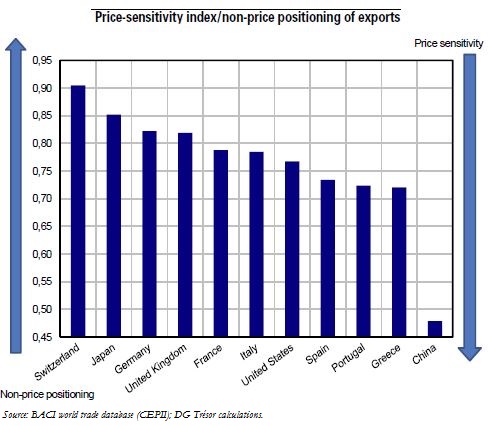Trésor-Economics No. 122 - What is the "non-price" positioning of France among advanced economies?
It seems hard to explain the divergent export dynamics of advanced economies solely on the basis of global demand and price competitiveness. "Non-price" determinants such as quality, innovation, design, brand image and distribution networks also help to explain export performance.
However, standard measures of "non-price" competitiveness - for example, qualitative indicators and econometric methods - yield mixed results.
To capture the "non-price" positioning of advanced economies, we developed a non-econometric approach to export price-sensitivity based on revealed-preference theory. We can explain the price sensitivity of exporting countries by trade specialisation and quality range.
France - like Italy and the United States - is found to have a median non-price positioning relative to the main developed countries. Our results partly explain France's weak export performance in the 2000s, notably by comparison with Germany, but they also reflect its structural comparative advantages. The similar price-competitiveness patterns of Germany and France have not had identical effects on export performance. In Germany, a country with a relatively low sensitivity to price competitiveness, the steady improvement in export performance seems mainly due to a non-price competitiveness advantage. In France, a country more sensitive to price competitiveness, the same mild decline in price competitiveness observed before the crisis appears to have had a more adverse impact on export performance.
The breakdown of France's non-energy trade balance by contribution of "quality" dominant products, "price" dominant products and "intermediate" products shows that the deterioration since the early 2000s is mostly due to the worsening balances for "price" products and, to a lesser extent, "mid-range" products. The doubling of the trade surplus for "quality" products does not suffice to offset the decline of the other components. These patterns confirm that, while France has a reasonably good positioning on non-price criteria and high-technology products, its position is not strong enough to withstand an erosion in price competitiveness.
France's median positioning in non-price competitiveness makes it vulnerable to both price and non-price competition. This requires action on both fronts.
